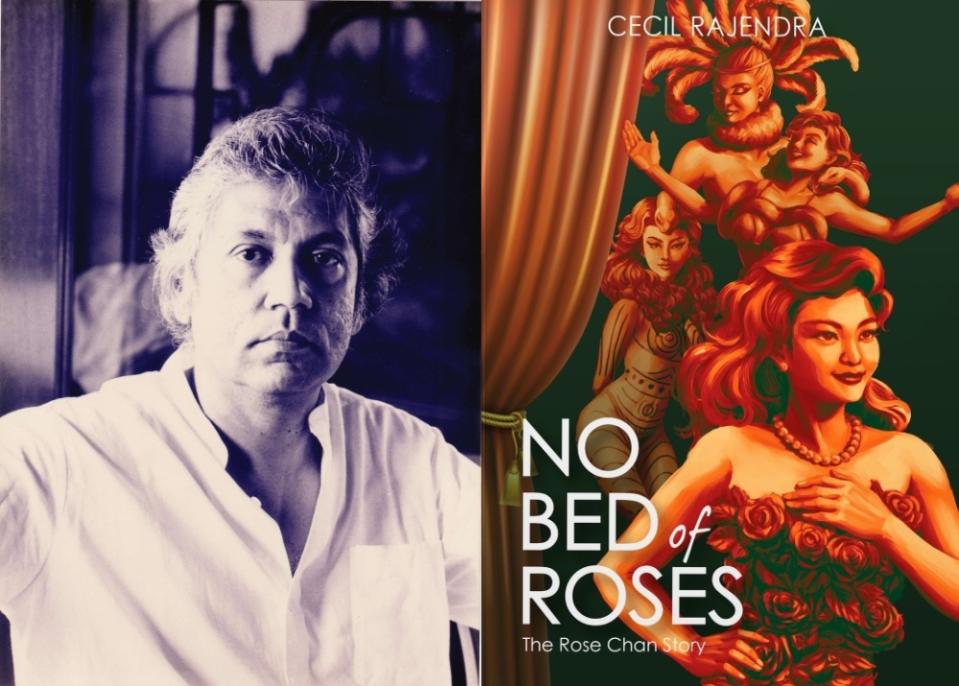Forgotten as a feminist, Malaysian striptease queen Rose Chan back in the spotlight with new 10th anniversary edition of her biography

KUALA LUMPUR, June 8 — Many remember the legendary Rose Chan as a striptease queen but they forget that she was also a feminist who fought her way to the top in the 1950s male-dominated entertainment business.
Back then, when Chan started out as a tari dancer, nightclubs and cabarets were totally monopolised by men.
She not only fought for their rights and organised a better deal but also went a step further by forming her own company, The Rose Chan Revue.
“She was probably Malaysia’s first feminist and her company was probably the first in Asia where a woman was the manager, choreographer and star,” said Cecil Rajendra, author of authorised biography No Bed of Roses: The Rose Chan Story in an interview with Malay Mail.
“Also, in a business that has always been closely monitored by the police and the underworld, Rose had gangsters in one pocket and the police in the other!”
Chan also supported and employed transgenders throughout her life.
His book, the only official biography of Chan, was published a decade ago by Marshall Cavendish Editions, 26 years after her death on May 26, 1987.
Now, a 2023 10th anniversary edition by Clarity Publishing, with new photos and material, has just been released.

Cecil, author of over 25 books, in his 60s and the cover of the 10th anniversary edition of ‘No Bed of Roses: The Rose Chan Story’. — Picture courtesy of Clarity Publishing
Among the additional new material is a picture of Chan leaning against a coconut tree.
One of her favourite songs was Underneath the Coconut Tree, regularly sung by her singer-in-residence Francis at her Sakura Club in Penang.
More interesting are the never-seen-before copies of summonses and an invitation to Chan’s last birthday party where Rajendra was her guest of honour.
Summonses?
“When the book first came out, many people were sceptical about how well I knew Rose Chan and whether I was really her lawyer,” said the lawyer-poet and human rights activist, now 82.
On pages 210-220 of his book are the summonses of some of her cases he attended and the civil matter where she asked him to take action to recover RM2,000 from a man who tried to scam her with a sob story.
“Rose had a huge heart and was always helping the needy and unfortunately many tried to take advantage of her generosity,” he said.
The new documents also include a letter from Times Books International, her then publishers, where Chan told them that only Rajendra could write her story.
On how long it took for him to write the book, he said: “I really can’t tell. I started taking notes in the 1980s when she was still alive and put together her whole story in 2012.”
What he enjoyed most about it was chatting with her and Lee Ying, her stage manager of the 50s as they related stories of their early escapades.
These sessions often took place in her kitchen where she would serve them some of her exotic dishes such as bird’s nest soup with a sprinkling of chopped ham and shark’s fin cream soup with a splash of brandy, for that extra kick.
Chan had already ruled the stage as a consummate professional and supreme showperson before she shot to fame as a striptease queen after her bra accidently snapped leaving her topless at Ipoh’s Majestic Theatre in 1952.
Whether she mesmerised as a champion ballroom dancer or astounded the audience by bending iron bars, having motorcycles ridden over her or wrestling with pythons, she was the star attraction that brought the house down.

Chan wrestling with pythons in her heyday — years later in her 60s, she attributed the blood clots around her body to the python-coiling acts. — Picture courtesy of Cecil Rajendra
“She was no backstreet performer,” said Cecil, who as a 15-year-old tried to sneak into New World Park with friends, only to be thrown out by a security guard.
“All her shows were licenced and staged in public parks, theatres and cinema halls and cabarets all over Asia.
“Her shows were advertised in the national press and patronised by all sections of society from ministers to rubber tappers.”
Why should young Malaysians of today remember Rose Chan, Flower of Malaya?
“She was a self-made woman who rose from abject poverty to become an international icon and that in the days before television, the internet and social media,” said Cecil, who himself is a living legend as the first in the country to start a mobile legal aid clinic and a nominee of the Nobel Prize in Literature in 2005.
Like it or not, Chan was and remains the only Asian superstar who inspired a song that was an international hit in both the UK and US, sung by American singer Frankie Laine and written by English lyricist Wilfred Thomas.
Rose, Rose I Love You was also recorded in four languages by then Minister of Mirth, Datuk Zainal Alam, the famous national broadcaster in 1955.
“Young Malaysians could do worse than emulate her daring and entrepreneurship.”


